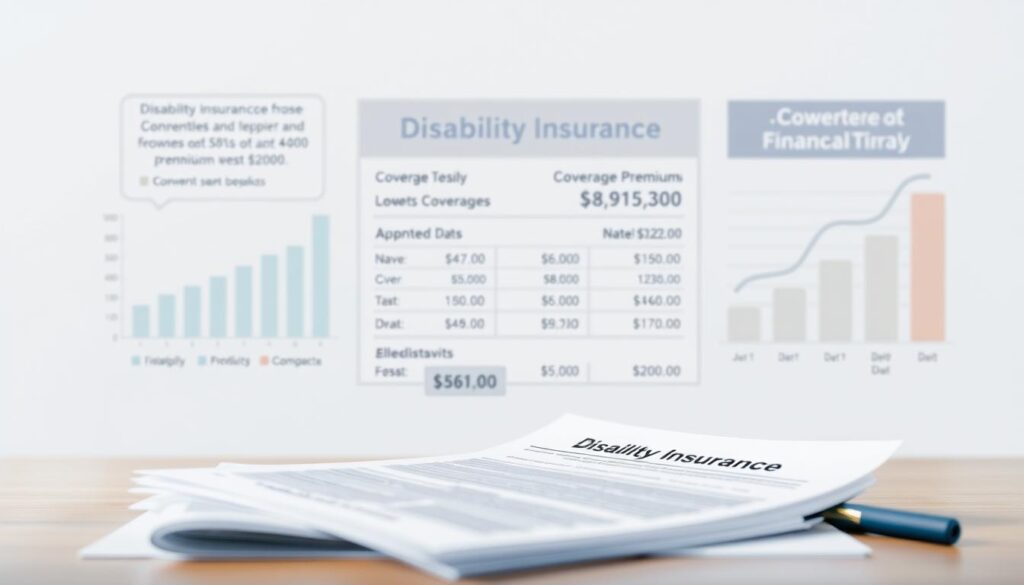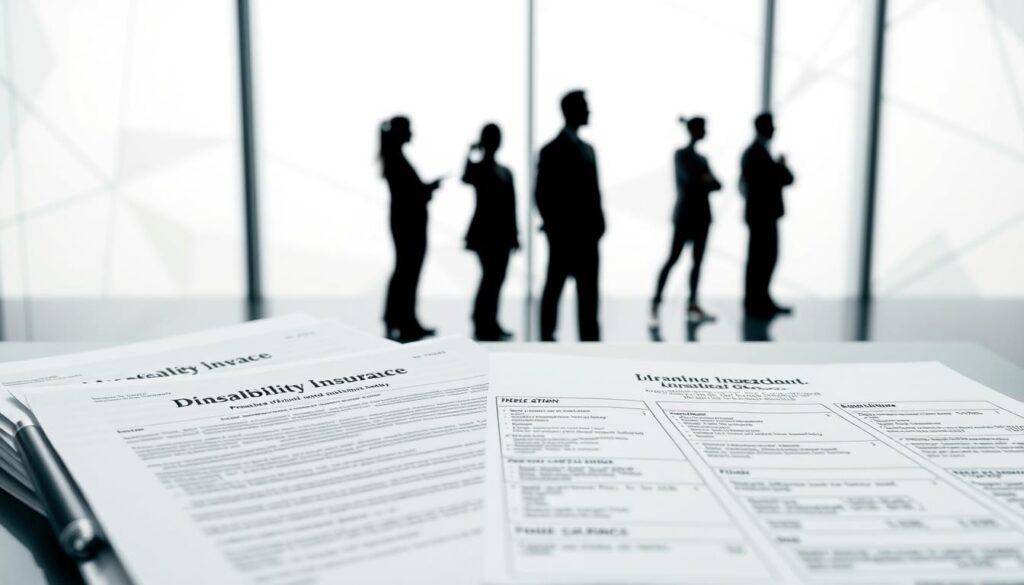Are you ready for the unexpected? Life can change quickly, and a sudden illness or injury can affect your income. That’s why Disability Insurance Elective Coverage is important. It’s a safety net that keeps your finances stable.
It’s key to understand DIEC for your financial safety. This coverage gives you a steady income if you can’t work because of a disability. With DIEC, you can keep up with your bills, even when you’re not working.
Key Takeaways
- DIEC provides financial protection in case of a disability.
- It helps you maintain your standard of living.
- Understanding your coverage options is essential.
- DIEC can be a vital part of your financial planning.
- It’s important to review your policy details carefully.
What Is Disability Insurance Elective Coverage
Looking for a way to protect your income from unexpected disabilities? Disability Insurance Elective Coverage might be what you need. It’s designed to keep your finances safe if you can’t work due to illness or injury.
Definition and Basic Concepts
Disability Insurance Elective Coverage (DIEC) is for self-employed folks and independent contractors. It’s not a must-have; it’s something you can choose to buy. DIEC is not automatically provided.
This insurance acts as a financial safety net. If you can’t work because of a disability, DIEC can help. It replaces part of your income, so you can keep up with your bills.
The Purpose of DIEC
The main goal of DIEC is to prevent financial hardship when you’re disabled. It gives you a steady income, so you can support yourself and your family, even if you can’t work.
DIEC is key for self-employed and independent contractors. They don’t get disability insurance from their employers. By choosing DIEC, they can keep their income safe from unexpected disabilities.
Eligibility Requirements for DIEC
Knowing the rules for Disability Insurance Elective Coverage (DIEC) is key for those who work for themselves or own small businesses. They need to protect their income from unexpected disabilities.
Self-Employed Individuals
Self-employed folks can get DIEC if they run a real business and report their earnings on taxes. This includes freelancers and solo business owners who don’t have a traditional job.
Small Business Owners
Small business owners, even those with companies, can get DIEC. Their eligibility depends on their business income and what they do.
Independent Contractors
Independent contractors, who aren’t company employees, can also get DIEC. This group includes many professionals, like consultants and independent sales reps.
Income and Work History Requirements
To get DIEC, you need to meet certain income and work history rules. You must have made money from your business or self-employment recently before applying.
| Category | Eligibility Criteria |
|---|---|
| Self-Employed Individuals | Legitimate business operation, reported income on tax returns |
| Small Business Owners | Business income, nature of work |
| Independent Contractors | Not considered employees, earned income from contracting work |
A financial expert says, “DIEC gives peace of mind to self-employed and small business owners. It ensures they’re financially safe if they get disabled.”
“Disability insurance is not just for employees; it’s a vital consideration for anyone with earned income, specially the self-employed and small business owners.”
Benefits of Disability Insurance Elective Coverage
Disability Insurance Elective Coverage (DIEC) offers many benefits. It’s a big help for those who aren’t traditionally employed. It ensures you can keep up your lifestyle even if you can’t work.
Income Protection During Disability
DIEC is great for protecting your income when you’re disabled. If illness or injury stops you from working, DIEC helps. It replaces part of your income, so you can pay your bills.
Coverage for Non-Work-Related Injuries
DIEC covers disabilities from injuries or illnesses not related to work. This is different from workers’ compensation, which only covers work-related injuries. So, you’re protected no matter where your disability comes from.
Peace of Mind for Self-Employed Individuals
For self-employed people, DIEC brings peace of mind. It means you have a financial safety net. This lets you focus on your business or recovery without worry.
| Benefit | Description |
|---|---|
| Income Protection | Partial income replacement during disability |
| Non-Work-Related Coverage | Covers disabilities from non-work-related injuries or illnesses |
| Peace of Mind | Financial security for self-employed individuals |
How Disability Insurance Elective Coverage Works
It’s important to know how Disability Insurance Elective Coverage (DIEC) works. This coverage is meant to protect your finances if you can’t work because of illness or injury.

Coverage Periods
The length of time you can get benefits if you’re disabled varies. DIEC policies can offer coverage from a few months to years, or even until you retire. It depends on the policy you choose.
Benefit Calculations
How much you get from DIEC is based on your income when you become disabled. You’ll usually get a percentage of what you earned, helping you financially.
Waiting Periods
Before you start getting benefits, there’s a waiting period. This can be 30 to 180 days. You must be disabled during this time to get benefits.
Disability Definitions and Qualifications
To get benefits, you must meet the policy’s disability criteria. This means you can’t do your job because of illness or injury. Some policies are stricter, requiring you to be unable to work at all.
Knowing these details about DIEC helps you understand your coverage better. This way, you can make sure you’re well-protected financially.
The Step-by-Step Application Process
Applying for Disability Insurance Elective Coverage (DIEC) might seem hard. But, breaking it down into steps makes it easier. To apply for DIEC, you need to know the process and prepare well.
Gathering Required Documentation
The first step is to gather all needed documents. You’ll need proof of income, business records, and ID. Having these documents ready will make your application smoother.
Completing the Application Form
With your documents ready, the next step is filling out the DIEC application form. This form asks for details about your income, job, and health. It’s important to fill it out correctly to avoid delays.
Medical Examinations and Requirements
You might need to have a medical exam as part of the application. This exam checks if you’re eligible for DIEC. You’ll need to share your medical history and do any required tests.
Submission and Follow-up
After filling out the form and any medical exams, it’s time to submit your application. Make sure to follow up with the authorities to confirm they got it. Also, ask about the status of your claim.
By following these steps and being well-prepared, you can go through the DIEC application process more easily. Knowing what’s needed and staying organized will help make the application process smoother.
Costs and Premiums of DIEC
Understanding the costs of Disability Insurance Elective Coverage is key. It affects your finances. Several factors influence the costs and premiums of DIEC, which we’ll discuss.
Premium Calculation Factors
The cost of Disability Insurance Elective Coverage depends on your age, job, income, and the benefit you want. The younger you are, the less you pay. Your job also matters, with some jobs seen as riskier than others.
Payment Options and Schedules
You can pay your DIEC premiums monthly, quarterly, or yearly. Your choice can change the cost, with yearly payments sometimes cheaper. Pick a payment plan that fits your budget to keep coverage.
Tax Implications and Considerations
Think about the taxes on DIEC premiums and benefits. Usually, premiums paid with after-tax money mean tax-free benefits. But, if you claim premiums as a business expense, your benefits might be taxed. Knowing this can help you choose better.

| Factor | Impact on Premium | Considerations |
|---|---|---|
| Age | Lower age = lower premium | Premiums increase with age |
| Occupation | Higher risk = higher premium | Certain professions are considered higher risk |
| Income Level | Higher income = higher premium | Benefit amount is tied to income level |
| Benefit Amount | Higher benefit = higher premium | Choose a benefit amount that meets your needs |
EDD Elective Coverage in California
EDD Elective Coverage in California helps protect you financially if you get sick or hurt. It’s key for those who work for themselves or own a business. They often don’t have the usual disability insurance.
California-Specific Requirements
To get EDD Elective Coverage, you must meet certain California rules. You need to be self-employed or own a business that doesn’t have to join the state’s disability insurance.
- You must be a California resident.
- You need to have a business or be self-employed.
- Your income must meet the minimum requirements set by the EDD.
State Disability Insurance (SDI) Connection
EDD Elective Coverage is tied to the State Disability Insurance (SDI) program. Knowing this link is key to getting the most from your benefits.
Key aspects of the SDI connection include:
- Benefits from EDD Elective Coverage and SDI work together.
- You might get more benefits if you’re disabled.
Differences from Other States’ Programs
California’s EDD Elective Coverage is different from other states. For example:
- California’s program covers self-employed people more fully.
- The rules for joining are more flexible than in some other states.
Knowing these differences helps you choose the right disability insurance for you.
Maintaining Your Disability Insurance Elective Coverage
After getting Disability Insurance Elective Coverage (DIEC), keeping it active is key. This means following a few important steps. These steps help keep your coverage going and make sure it fits your needs.
Premium Payment Requirements
Timely premium payments are vital to keep your DIEC active. You must pay on time to avoid losing coverage. Missing a payment can result in a lapse, leaving you unprotected in case of disability.
Reporting Income Changes
Because DIEC is based on your income, report any big changes to your insurance provider. This keeps your coverage and premiums up to date with your current income.

Renewal Processes
DIEC policies have renewal periods. Knowing the renewal process is important. This includes any changes to premiums or coverage terms. Make sure to mark renewal dates to keep your coverage going.
When and How to Update Your Coverage
Changes in your finances or job might mean you need to update your DIEC. This could mean more or less coverage. Check your policy every year or when big life changes happen to see if you need to update.
| Maintenance Task | Frequency | Importance |
|---|---|---|
| Premium Payments | Monthly/Quarterly | High |
| Reporting Income Changes | As Needed | High |
| Policy Renewal | Annually | High |
| Coverage Updates | Annually or as needed | Medium |
Filing a Claim Under Your DIEC
Knowing how to file a claim under your Disability Insurance Elective Coverage (DIEC) is key. It helps you get the benefits you deserve. When you can’t work because of a disability, the claims process can be tough. But, with the right info, you can handle it well.
When to File a Claim
File a claim as soon as you’re disabled and can’t work. Starting early means you get benefits faster. Check your policy to know when to file.
Required Documentation
You’ll need lots of documents to file a claim. This includes medical records, proof of income, and more. Make sure your documents are complete and correct to make the process smoother.
The Claims Review Process
After you submit your claim, it will be reviewed. They check if you qualify for benefits based on your policy and the info you give. They look at medical records, income, and other important details.
Appeals Process for Denied Claims
If your claim is denied, you can appeal. The appeal process asks for more info or clears up any issues. Knowing the appeals process and preparing well can help you win your appeal.
Filing a claim under your DIEC needs careful attention and understanding. Being ready and knowing what to expect helps you get through this tough time.
Comparing Disability Insurance Elective Coverage with Alternatives
Disability Insurance Elective Coverage (DIEC) offers benefits for those who qualify. But how does it compare to other disability insurance options? Knowing the differences is key to protecting your financial future.
Private Disability Insurance
Private disability insurance is sold by companies to individuals. It might offer more choices and higher benefits than DIEC. Yet, it could cost more and have different rules for who can get it.
Social Security Disability Insurance
Social Security Disability Insurance (SSDI) is a federal program for those who can’t work because of a disability. SSDI has tough rules and might not pay out as fast as DIEC.

Workers’ Compensation
Workers’ compensation helps employees who get hurt on the job. It’s not a replacement for DIEC, as it only covers job-related injuries. Those who are self-employed or not covered by workers’ compensation might find DIEC more useful.
Group Disability Plans
Group disability plans are for employees through their employers. These plans vary a lot, and not everyone can get them. Self-employed people or those who change jobs might not have access.
When picking between DIEC and other options, think about your situation. Consider your job, income, and what you need for disability coverage.
Common Mistakes to Avoid with DIEC
When thinking about Disability Insurance Elective Coverage (DIEC), it’s key to know the common mistakes. Being informed helps you avoid costly errors. This way, you can navigate the process better.
Underestimating Coverage Needs
One big mistake is thinking you don’t need enough coverage. You must accurately figure out your income and expenses. Failing to do this can leave you financially at risk if you get disabled.
Missing Premium Payments
Missing payments can cause your coverage to lapse. This leaves you without protection. It’s important to have a reliable payment plan. Setting up automatic payments can help you avoid missing a payment.
Inadequate Documentation
Not having enough documentation can cause delays or claim denials. Make sure you keep accurate and detailed records. This includes medical documents and proof of income. Organizing your documents makes the claims process smoother.
Not Understanding Policy Limitations
Not knowing what your DIEC policy covers can lead to surprises. It’s important to read your policy carefully. Ask questions if you’re unsure about anything.
Conclusion
Disability insurance elective coverage is key to a solid financial plan. It helps you understand what you need and how to get it. This way, you can make smart choices about your coverage.
This type of insurance keeps your income flowing even when you can’t work. It helps you keep your lifestyle the same, no matter what. With the right plan, you’ll feel secure, knowing you’re ready for anything.
Looking into disability insurance? Make sure to check out EDD elective coverage too. This helps you find the best plan for you. It ensures you’re well-protected and ready for life’s surprises.
FAQ
What is Disability Insurance Elective Coverage (DIEC)?
DIEC is a type of insurance. It helps people who can’t work because of a disability. It gives them money to live on.
Who is eligible for DIEC?
Self-employed people, small business owners, and independent contractors can get DIEC. They need to meet certain income and work history rules.
How do I apply for DIEC?
First, gather the needed documents. Then, fill out the application form. You might need to do medical tests. After that, send in your application for review.
What are the benefits of having DIEC?
DIEC protects your income if you get disabled. It also covers injuries not related to work. It gives peace of mind, which is important for self-employed people.
How are DIEC premiums calculated?
Your DIEC premiums depend on your income, job, age, and how much coverage you want.
Can I customize my DIEC coverage?
Yes, you can. Choose how much money you want, how long you want to wait before getting benefits, and how long you want coverage for.
What is EDD Elective Coverage, and how does it relate to DIEC?
EDD Elective Coverage is for California. It’s for self-employed people and others not usually covered. It’s like DIEC but only for California.
How do I maintain my DIEC coverage?
Keep your coverage by paying premiums on time. Tell your insurance about any income changes. Follow their renewal process.
What is the process for filing a claim under DIEC?
To file a claim, tell your insurance and give them the needed documents. They will review your claim. If they say no, you can appeal.
How does DIEC compare to other disability insurance options?
DIEC is for self-employed people. It has special benefits. Compare it to private insurance, Social Security, workers’ comp, and group plans to find the best for you.
What are common mistakes to avoid with DIEC?
Don’t underestimate your needs, miss payments, or not have the right documents. Also, know what your policy can and can’t do.

